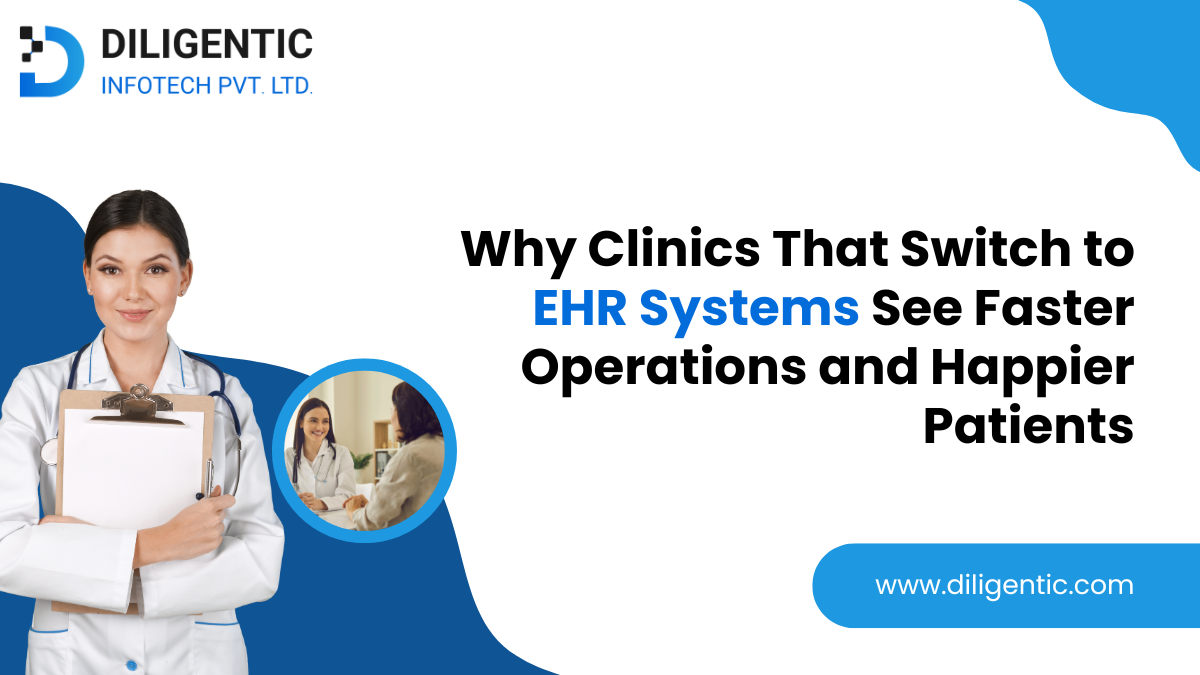SHARE

Why Clinics That Switch to EHR Systems See Faster Operations and Happier Patients

EHR systems, also known as electronic health records systems, are becoming essential for clinics that want to improve patient care and reduce operational delays. Beyond going paperless, EHR systems centralize patient information, cut down errors, support staff, and deliver a more personal, efficient experience for patients. This article breaks down everything you need to know: what EHR systems are, how they work, why they matter, what features they cover, and how much it takes to build one.
Book a free demo to see how an EHR system can benefit your clinic and transform patient care.
Table of Contents
What Is an EHR System?
An EHR system is a computer-based tool that helps store and manage patient health records, making the information easy to access and update in real time. It replaces manual processes like paper files, Excel sheets, and verbal handoffs.
EHR systems typically include:
- Patient medical history
- Lab results and imaging
- Allergies and prescriptions
- Treatment and diagnosis records
- Appointment scheduling
- Secure messaging with patients
- Insurance and billing data
Unlike EMR (Electronic Medical Records), which are usually limited to a single clinic, EHR systems allow seamless data sharing across healthcare providers. This means your electronic patient record is always up-to-date and accessible, whether you visit a general physician, a specialist, or a hospital.
Why Are EHR Systems Essential for Clinics and Hospitals?

1. Faster Patient Handling
Manual paperwork takes time. Searching through physical files or entering the same information repeatedly slows down your clinic’s workflow. EHR systems automate routine tasks:
- Patients can self-check in digitally.
- Medical history is pulled up instantly.
- Prescriptions and lab results are shared in real time.
This results in shorter wait times and more appointment slots per day.
2. Better Decision Making with Complete Records
Clinicians don’t have to rely on memory or handwritten notes. They can quickly see full patient details, including medications, past treatments, allergy alerts, and lab reports.
This means:
- Fewer missed diagnoses
- Better continuity of care
- Informed and confident decisions
3. Smoother Internal Communication
EHR systems sync data across departments like radiology, pharmacy, and billing. Whether it’s an X-ray image or a billing code, every team accesses the same information.
The result?
- No repeated tests
- No duplicate data entries
- Less time wasted on follow-ups or clarifications
4. More Satisfied Patients
A patient’s experience is shaped by how easy, clear, and responsive their care feels. With an EHR System:
- They don’t have to repeat details each visit.
- They receive follow-up reminders and digital prescriptions.
- Their health records are available through patient portals, giving them more control and transparency.
Clinics that adopt EHR systems often report a noticeable jump in patient reviews and referrals.
5. Increased Accuracy, Lower Risk
- EHR software flags drug interactions and allergy risks.
- Doctors are alerted about unusual test results.
- Admins avoid billing mistakes through automation.
This helps reduce clinical errors, improves compliance, and builds patient trust.
What Functional Areas Does an EHR System Cover?
A comprehensive electronic health records software solution touches every part of the clinic workflow. Below is a breakdown of what a solid EHR system includes:
| Module | What It Does |
|---|---|
| Patient Management | Add, edit, and organize patient profiles |
| Clinical Charting | Doctors input notes, view history, and add diagnoses |
| e-Prescription | Send prescriptions directly to pharmacies |
| Billing and Claims | Automate invoices, track payments, and insurance |
| Lab Integration | Real-time updates for lab results and imaging |
| Alerts & Reminders | Notify staff and patients of upcoming tasks or risks |
| Patient Portal | Patients view their health records, lab reports, and medications |
| Teleconsultation | Video calls and remote checkups with documentation |
This integrated approach leads to smoother clinical operations and better care delivery.
Real Impacts: What Happens After You Switch to an EHR System?

Let’s talk about what changes after switching:
1. For Staff
- No more chasing files.
- Less time on data entry.
- Fewer mistakes in prescriptions and tests.
2. For Doctors
- Quick access to full patient history.
- Time saved per consultation.
- Better collaboration with specialists.
3. For Patients
- No confusion around medications.
- Clear post-visit summaries.
- Higher satisfaction and trust.
One clinic that implemented a basic EHR system saw a 35% drop in missed follow-ups and a 50% improvement in time spent per patient file lookup within the first two months.
How EHR Systems Lead to Happier Patients

- More Control Over Their Health Journey: With secure access to their health records, patients can review their prescriptions, test results, and visit history anytime. This reduces confusion, helps them stay on top of treatments, and gives them a sense of control over their care.
- Fewer Surprises, More Clarity: Digital records eliminate the guesswork. Patients don’t have to worry about repeated tests or missed instructions. Clear summaries, alerts, and digital prescriptions improve understanding and reduce anxiety, especially after visits.
- Stronger Connection with Care Providers: When clinicians walk in fully informed, patients notice. There’s less repetition, fewer delays, and more meaningful conversations. This builds trust and leaves a lasting impression of being heard and cared for.
- A Seamless, Stress-Free Experience: From appointment reminders to online check-ins, the process feels more modern and less chaotic. Patients spend less time waiting, know what to expect, and feel confident that nothing gets missed behind the scenes.
How Much Does It Cost to Build an EHR App?
Creating a custom EHR application depends on your needs. Below is a general cost and time estimate:
| App Type | Estimated Cost (USD) | Timeline |
|---|---|---|
| Basic App (registration, charting) | $8,000–$15,000 | 6–8 weeks |
| Standard EHR with billing and lab modules | $30,000–$50,000 | 2–4 months |
| Advanced (AI reports, patient app, telehealth) | $50,000-$80,000 | 5–7 months |
These are rough estimates. The actual cost also depends on:
- Compliance needs (e.g., HIPAA, HL7)
- Custom UI/UX design
- Third-party integrations (labs, insurance, pharmacy)
- Cloud hosting and security layers
Must-Have Features for a Modern EHR App
- Role-based access control
- Data backup & recovery
- Appointment scheduling
- Offline mode for mobile clinics
- Patient progress tracking
If you’re looking to build such an app, it’s better to consult a team that has experience in healthcare app development.
What You Don’t Hear Enough: Real-World Insights That Matter
1. Patients Feel More in Control of Their Care
When patients can access their health records, they no longer feel left in the dark. They come prepared for appointments, understand their medications, and take a more active role in their treatment. This leads to:
- Fewer misunderstandings
- Higher follow-through on care plans
- Greater trust in providers
It’s not just about access; it’s about empowerment.
2. Staff Stress and Burnout Drop
When staff aren’t buried in paper logs or toggling between disconnected tools, their workload becomes more manageable. With EHR Systems:
- Information is just a search away
- Daily admin tasks are reduced
- Communication between departments is smoother
This frees up mental energy to focus on patient care rather than paperwork.
3. Revenue Loss Quietly Shrinks
No-shows, missed billing entries, and rejected insurance claims silently chip away at a clinic’s bottom line. EHR systems reduce that by:
- Sending automatic appointment reminders
- Generating accurate billing and coding
- Ensuring documentation is consistent and complete
Over time, even small reductions in missed revenue make a major difference.
4. Data Turns into Smart Growth Decisions
Every interaction, every entry, and every outcome captured in the EHR becomes usable data. With built-in reports and analytics, clinics can:
- Identify which services are most in demand
- Track chronic illness patterns by age or region
- Optimize staffing based on visit volume
This makes growth measurable, not guesswork. It helps you focus not just on being faster, but also on being smarter.
Final Thoughts: Make the Switch the Smart Way
EHR systems do more than digitize your practice; they reshape how your clinic works, communicates, and grows. From smoother workflows to more confident patient care, the change goes far beyond digital records.
At Diligentic Infotech, we help clinics build custom, secure, and scalable electronic health records software that meets real-world needs. Whether you’re a small practice or a growing multi-location clinic, we’ll guide you from planning to launch.
👉 Book a Demo NOW and turn your clinic into a modern, data-driven care provider, with less paperwork and more patient satisfaction.
FAQs
Can small clinics afford EHR systems?
Yes, EHR systems come in scalable versions with flexible pricing to fit small clinic budgets and future growth.
Is patient data safe in EHR systems?
Yes, when the system uses strong encryption and follows healthcare data laws like HIPAA or HL7, patient data stays secure.
Will staff need training to use EHR software?
Yes, but most systems are intuitive, and staff typically adapt quickly with minimal training and support.
Can patients access their own records?
Yes, patients can view their records, prescriptions, and test results anytime through a secure patient portal.
Is it possible to build a custom EHR app?
Yes, custom EHR apps can be built to match your clinic’s specific needs, workflow, and compliance goals.
Does EHR improve patient care?
Yes, by giving doctors real-time access to full medical history, improving decisions, communication, and safety.
Engage with our experts
Subscribe to our newsletter!
Be the first to get exclusive offers and the latest news.
Posted on 23 Jul 2025
How IT Solutions Help Optometrists and Ophthalmologists Save Time and Deliver Quality Care
IT solutions are reshaping how eye care professionals manage their practice, interact with patients, and deliver timely treatment. From electronic records to AI-enhanced diagnostics, these tools help both optometrists and ophthalmologists save time, reduce errors, and ensure consistent quality care. This article explains how technology supports their workflows, with a detailed comparison between the two roles, real examples, and practical benefits.
Posted on 28 Jul 2025
EHR System Know-How: Seamless Hospital Integration from Labs to Pharmacies and Beyond
A well‑built EHR system becomes the hospital’s central nervous system only when it connects every node, from automated lab analyzers to community pharmacies. This guide explains how that connection works, why it matters, and which standards, steps, and safeguards keep data and patients safe.
Posted on 17 Sep 2025
7 Reasons Mobile Apps Are the Future of Real Estate Property Search
Home shoppers now start and continue their property search on phones. A well-built Real Estate App outperforms mobile web with faster results, smarter alerts, richer media, and native features like GPS, camera, and offline notes. Add thoughtful privacy, co-buyer collaboration, and on-site tools, and you’ve covered what real buyers actually do on weekends: drive, tour, compare, and decide.

Reach out
Let’s Start Together
We're a collective of high caliber designers, developers, creators, and geniuses. We thrive off bouncing your ideas and opinions with our experience to create meaningful digital products and outcomes for your business.
Phone Number
+1 (825) 760 1797
hello[at]diligentic[dot]com
